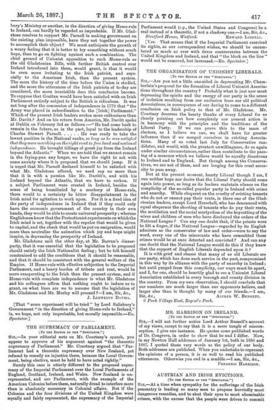THE SUPREMACY OF PARLIAMENT.
[TO tux EDITOR or T/15 .Sracrarms."1
SM.,—In your editorial note on Mr. Courtney's speech, you appear to approve of his argument against "the theoretic supremacy of Parliament." Mr. Courtney argued that "Par- liament had a theoretic supremacy over New Zealand, yet refused to remedy an injustice there, because the Local Govern. ment, being elective, must be held to have acted rightly."
Surely this case is utterly different to the proposed supre- macy of the Imperial Parliament over the Local Parliaments of England, Scotland, Ireland, and Wales. New Zealand is un- represented, and our Parliament, with the example of the American Colonies before them, naturally dread to interfere more than is absolutely necessary in Colonial affairs. But if the Colonies and the four divisions of the United Kingdom were equally and fairly represented, the supremacy of the Imperial Parliament would (e.g., the United States and Congress) be a real instead of a theoretic, if not a shadowy one.—I am, Sir, &c., [Yes. That means that if the Imperial Parliament exercised its rights, as our correspondent wishes, we should be encum- bered as much as ever with fierce controversies between the United Kingdom and Ireland, and that " the block on the line " would not be removed, but increased.—En. Spectator.]














































 Previous page
Previous page